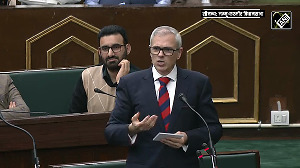The government has decided to allow 100 per cent foreign investment in private banks, though the cap on foreign institutional investor and non-resident Indian holdings will be reduced to 26 per cent from 49 per cent.
According to officials, a notification to this effect will be issued by the department of industrial policy and promotion in a few days.
| The impact |
|
Centurion Bank to be among the first gainers. Its proposal to FIPB would have raised the FDI level to 61% breaching the 49% cap FII exposure to ICICI Bank will have to be reduced to below 26% Foreign banks like HSBC and ABN Amro may now consider floating Indian subsidiarie |
At present, foreign direct investment in private banks is capped at 49 per cent, and an equal percentage is permitted through the foreign institutional investor and NRI routes.
The move to cap foreign institutional investor and NRI holdings at 26 per cent will mean that banks like ICICI Bank, where foreign institutional investors hold over 26 per cent of the paid-up capital, will have to bring down their exposure to the latter within the permissible limits.
The officials said Finance Minister Jaswant Singh had cleared the proposal. In the Budget for 2003-04, Singh had announced that the foreign direct investment limit in private banks would be raised to at least 74 per cent to facilitate investment and setting up of foreign bank subsidiaries in India.
Banks like ABN Amro and HSBC operate through branches in India, and have said in the past that floating subsidiaries would be considered only if the foreign investment limit was raised.
Ramesh Sobti, executive vice-president, ABN Amro said, "Higher foreign direct investment and relaxation of the 10 per cent cap on voting rights open possibilities for some banks to consider the subsidiary route."
ABN Amro would, however, consider priority sector lending and rural obligations before taking a final decision, Sobti added.
"Banks have to figure out whether the pros outweigh the cons, and have to wait for the operating guidelines," he said. Standard Chartered Bank and HSBC refused to comment.
The immediate gainer from the relaxation of the foreign investment norms will be Centurion Bank, which has a 30.64 per cent foreign holding.
After acquisition by Sabre Capital and the Bank of Muscat, it had sought the approval of the Foreign Investment Promotion Board to allow existing and new investors to infuse Rs 219 crore (Rs 2.19 billion) for restructuring its existing capital and raising the capital adequacy ratio to over 9 per cent.
While Rs 154 crore (Rs 1.54 billion) was to be infused in the first tranche, Rs 65 crore (Rs 650 million) was proposed to be raised through a rights issue.
The board was, however, of the opinion that a capital infusion of Rs 154 crore would take the foreign direct investment holding in the bank to over 61 per cent, thereby breaching the 49 per cent cap.
If the rights issue preceded the capital infusion, foreign direct investment in the bank would have increased to around 48 per cent.





 © 2025
© 2025